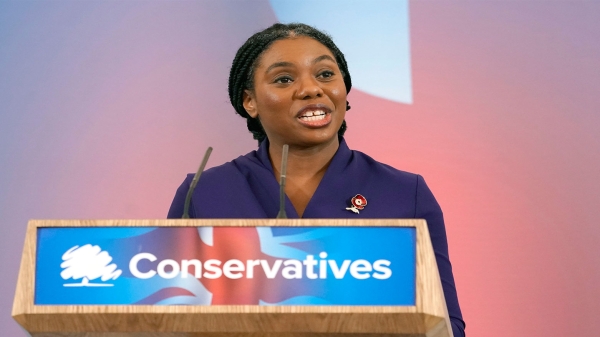History was made yesterday as the United Kingdom’s Conservative Party announced the election of Kemi Badenoch as its leader ahead of her closest rival, Robert Jenrick.
Badenoch, who received 53,806 votes to defeat Robert Jenrick who got 41,388, succeeds Rishi Sunak as leader of the opposition party.
The former British Business Secretary is the first black woman to lead a major political party in the UK and takes charge of a Conservative Party reeling from its worst-ever election defeat.
Born in Wimbledon, London, on January 2, 1980, to Nigerian parents, she spent her childhood in Lagos and the United States until she returned to the UK at the age of 16.
Badenoch is also the first Black woman to head a party that has had three other female leaders – Margaret Thatcher, Theresa May, and Liz Truss.
During her campaign, Badenoch pledged to return the Conservatives to “first principles” and launch a series of reviews in the coming months to shape a new policy platform.
The North West Essex MP is also the sixth Tory leader in less than eight and a half years and faces the challenge of uniting a fractured party.
“It is time to get down to business, it is time to renew.”
The charismatic, fire-brand right-wing leader succeeds Sunak, who became the first non-white British Prime Minister after taking over the Tories, Britain’s oldest party, in 2022.
“It is the most enormous honour to be elected to this role, to lead the party that I love, the party that has given me so much,” a smiling Badenoch said to a group of Conservative Party members after being announced the winner.
“I hope that I will be able to repay that debt,” she added.
The Labour Party’s landslide victory gave it a huge majority in Parliament and the Tories face at least four years in opposition before the next election is due.
Her campaign was called Renewal 2030 and has targeted the next election for the Tories to return to power.
Badenoch has been criticised at times for her outspoken approach, with opponents jumping on comments she had made about subjects such as maternity pay, gender equality, and net zero.
But she has long been popular among the party membership and previously ran to be leader in 2022.
It is not clear who her shadow cabinet will be made up of, but she had suggested that all those who ran to be leaders against her should be involved.
However, James Cleverly revealed the day before the results that he would be returning to the backbenches.
Badenoch has vowed to rebuild the Tory Party on more authentically conservative foundations, saying her training as a computer engineer had taught her how to fix problems.
She spoke often of “first principles” like freedom and individual responsibility.
And she has not hesitated to wade into thorny issues like transgender rights or Britain’s colonial legacy, deploring “woke” ideology and “nasty identity politics.”
Despite the challenges, Badenoch’s no-nonsense approach has earned her a loyal base among the Conservatives.
Known for her outspoken positions on identity politics and her desire to reduce state influence, she appeals to a faction within the party that believes a decisive rightward turn is necessary to reconnect with disillusioned voters.
She has a history of tense interactions with media figures, celebrities, and even some government officials during her time as a trade minister, but this has only bolstered her support among members who are wary of institutional and media influences.
Congratulating Badenoch on her victory, the Prime Minister, Sir Keir Starmer said: “Congratulations, Kemi Badenoch, on becoming the Conservative Party’s new leader.
“The first black leader of a Westminster party is a proud moment for our country.
“I look forward to working with you and your party in the interests of the British people.”
Ellie Reeves, who is chair of the Labour Party, delivered a more political attack: “It’s been a summer of yet more Conservative chaos and division.
“They could have spent the past four months listening to the public, taking responsibility for the mess they made, and changing their party.
“Instead, Kemi Badenoch’s election as leader shows they’re incapable of change.
“Meanwhile, the Labour Government is getting on with fixing the foundations of our economy and cleaning up the mess the Tories left behind.”
The combative former equalities minister now faces the daunting task of reuniting a divided and weakened party that was emphatically ousted from power in July after 14 years in charge.
Badenoch will become the official leader of the opposition and face off against Labour’s Starmer in the House of Commons every Wednesday for the traditional Prime Minister’s Questions.
However, she will be leading a much-reduced cohort of Tory MPs in the chamber following the party’s dismal election showing.
Having campaigned on a right-wing platform, she also faces the prospect of future difficulties within the ranks of Tory lawmakers, which includes many centrists.
Badenoch, born in London to Nigerian parents and raised in Lagos, has called for a return to conservative values, accusing her party of having become increasingly liberal on societal issues such as gender identity.
She describes herself as a straight-talker, a trait that has caused controversy on the campaign trail.
When addressing immigration, Badenoch said that “not all cultures are equally valid” when deciding who should be allowed to live in the UK.
She was widely criticised after suggesting that statutory maternity pay on small businesses was “excessive” and sparked a further furore when she joked that up to 10 per cent of Britain’s half a million civil servants were so bad that they “should be in prison.”


